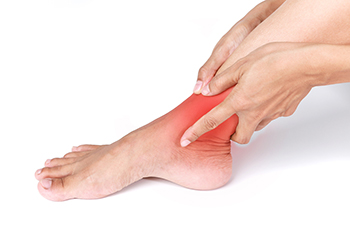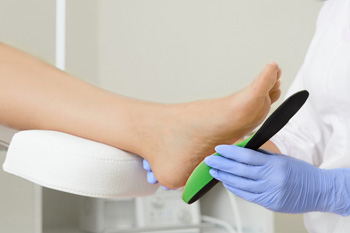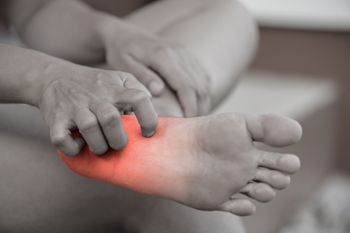Connect With Us
Blog
Items filtered by date: March 2022
Preventing Foot Problems in Children
 Parents can help their children prevent foot problems and associated pain as they age by taking care of and teaching their children to take proper care of their feet. Developing healthy foot habits in children starts with parents washing their children’s feet each day and making sure they are dry, buying shoes that fit properly (with enough room in the toe box to allow for growth), using right sized cotton and/or wool socks on children’s feet to keep them warm and allow room for development, cutting toenails straight across and not too short to prevent ingrown toenails, and allowing children to go barefoot in the home so their feet will grow and gain strength without restriction. Taking children to a podiatrist early on can start them off right, provide a baseline for their foot development, and introduce them to a specialist who will be able to diagnose and treat any foot problems that might arise in their lives.
Parents can help their children prevent foot problems and associated pain as they age by taking care of and teaching their children to take proper care of their feet. Developing healthy foot habits in children starts with parents washing their children’s feet each day and making sure they are dry, buying shoes that fit properly (with enough room in the toe box to allow for growth), using right sized cotton and/or wool socks on children’s feet to keep them warm and allow room for development, cutting toenails straight across and not too short to prevent ingrown toenails, and allowing children to go barefoot in the home so their feet will grow and gain strength without restriction. Taking children to a podiatrist early on can start them off right, provide a baseline for their foot development, and introduce them to a specialist who will be able to diagnose and treat any foot problems that might arise in their lives.
Making sure that your children maintain good foot health is very important as they grow. If you have any questions, contact Scott Matthews, DPM, MD of Salem Foot Care . Our doctor can provide the care you need to keep you pain-free and on your feet.
Keeping Children's Feet Healthy
Having healthy feet during childhood can help prevent medical problems later in life, namely in the back and legs. As children grow, their feet require different types of care. Here are some things to consider...
Although babies do not walk yet, it is still very important to take care of their feet.
Avoid putting tight shoes or socks on his or her feet.
Allow the baby to stretch and kick his or her feet to feel comfortable.
As a toddler, kids are now on the move and begin to develop differently. At this age, toddlers are getting a feel for walking, so don’t be alarmed if your toddler is unsteady or ‘walks funny’.
As your child gets older, it is important to teach them how to take care of their feet.
Show them proper hygiene to prevent infections such as fungus.
Be watchful for any pain or injury.
Have all injuries checked by a doctor as soon as possible.
Comfortable, protective shoes should always be worn, especially at play.
If you have any questions please feel free to contact our office located in Wikesboro, NC . We offer the newest diagnostic and treatment technologies for all your foot and ankle needs.
Custom Orthotics Can Help Ease Pain Due to Arthritis
People with rheumatoid arthritis or osteoarthritis are no strangers to foot pain and inflammation. Custom orthotics can often ease the pain and make walking and performing daily tasks more manageable. Orthotics, and custom orthotics in particular, are designed to spread the weight of the body more evenly across the feet, reduce pressure on sensitive areas and joints affected by arthritis, and address specific structural and biomechanical anomalies. When properly designed and fitted, custom orthotics may help arthritis sufferers to take less pain medications, and are even believed by some to have the potential of slowing the progression of arthritis. If you would like to see if orthotics may help your painful arthritic condition, make an appointment with a podiatrist. After examining your feet, your podiatrist will either create a mold or 3D digital scan of your feet and design orthotics custom fit to your individual feet, to address your specific pain points.
If you are having discomfort in your feet and would like to try orthotics, contact Scott Matthews, DPM, MD from Salem Foot Care . Our doctor can provide the care you need to keep you pain-free and on your feet.
What Are Orthotics?
Orthotics are inserts you can place into your shoes to help with a variety of foot problems such as flat feet or foot pain. Orthotics provide relief and comfort for minor foot and heel pain but can’t correct serious biomechanical problems in your feet.
Over-the-Counter Inserts
Orthotics come in a wide variety of over-the-counter inserts that are used to treat foot pain, heel pain, and minor problems. For example, arch supports can be inserted into your shoes to help correct overarched or flat feet, while gel insoles are often used because they provide comfort and relief from foot and heel pain by alleviating pressure.
Prescription Orthotics
If over-the-counter inserts don’t work for you or if you have a more severe foot concern, it is possible to have your podiatrist prescribe custom orthotics. These high-quality inserts are designed to treat problems such as abnormal motion, plantar fasciitis, and severe forms of heel pain. They can even be used to help patients suffering from diabetes by treating foot ulcers and painful calluses and are usually molded to your feet individually, which allows them to provide full support and comfort.
If you are experiencing minor to severe foot or heel pain, it’s recommended to speak with your podiatrist about the possibilities of using orthotics. A podiatrist can determine which type of orthotic is right for you and allow you to take the first steps towards being pain-free.
If you have any questions please contact our office located in Wikesboro, NC . We offer the newest diagnostic and treatment technologies for all your foot and ankle needs.
Diabetes Can Be a Risk to Your Feet
 One of the main side effects of diabetes is the problems it can cause to your extremities, as nerves become damaged and circulation of blood to the feet and toes is blocked. The result is often peripheral neuropathy (numbness to the toes and feet), and ischemia (reduced blood flow), which can lead to peripheral artery disease (PAD). Both conditions are serious and can severely threaten the health of your toes, feet, and possibly legs. One of the most important ways to prevent or control this ailment is to regularly maintain proper foot health. Some of the actions you or a health-care worker can take is to thoroughly inspect your legs, ankles, feet, and toes for sores, blisters, redness, or swelling. Also, it’s a good idea to wear shoes that fit correctly, keep your feet clean and moisturized, change socks frequently, and avoid tight elastic that further cuts off circulation. At the first sign of swelling, redness, discoloration, or unexplained pain in your feet, it’s strongly suggested that you set up an appointment with a podiatrist who can monitor your condition.
One of the main side effects of diabetes is the problems it can cause to your extremities, as nerves become damaged and circulation of blood to the feet and toes is blocked. The result is often peripheral neuropathy (numbness to the toes and feet), and ischemia (reduced blood flow), which can lead to peripheral artery disease (PAD). Both conditions are serious and can severely threaten the health of your toes, feet, and possibly legs. One of the most important ways to prevent or control this ailment is to regularly maintain proper foot health. Some of the actions you or a health-care worker can take is to thoroughly inspect your legs, ankles, feet, and toes for sores, blisters, redness, or swelling. Also, it’s a good idea to wear shoes that fit correctly, keep your feet clean and moisturized, change socks frequently, and avoid tight elastic that further cuts off circulation. At the first sign of swelling, redness, discoloration, or unexplained pain in your feet, it’s strongly suggested that you set up an appointment with a podiatrist who can monitor your condition.
Wound care is an important part in dealing with diabetes. If you have diabetes and a foot wound or would like more information about wound care for diabetics, consult with Scott Matthews, DPM, MD from Salem Foot Care . Our doctor will assess your condition and provide you with quality foot and ankle treatment.
What Is Wound Care?
Wound care is the practice of taking proper care of a wound. This can range from the smallest to the largest of wounds. While everyone can benefit from proper wound care, it is much more important for diabetics. Diabetics often suffer from poor blood circulation which causes wounds to heal much slower than they would in a non-diabetic.
What Is the Importance of Wound Care?
While it may not seem apparent with small ulcers on the foot, for diabetics, any size ulcer can become infected. Diabetics often also suffer from neuropathy, or nerve loss. This means they might not even feel when they have an ulcer on their foot. If the wound becomes severely infected, amputation may be necessary. Therefore, it is of the upmost importance to properly care for any and all foot wounds.
How to Care for Wounds
The best way to care for foot wounds is to prevent them. For diabetics, this means daily inspections of the feet for any signs of abnormalities or ulcers. It is also recommended to see a podiatrist several times a year for a foot inspection. If you do have an ulcer, run the wound under water to clear dirt from the wound; then apply antibiotic ointment to the wound and cover with a bandage. Bandages should be changed daily and keeping pressure off the wound is smart. It is advised to see a podiatrist, who can keep an eye on it.
If you have any questions, please feel free to contact our office located in Wikesboro, NC . We offer the newest diagnostic and treatment technologies for all your foot care needs.
Ways to Handle Neuromas in the Foot and Ankle
A foot or ankle injury can cause a disruption of the nerves that causes pain, tingling, a burning sensation, and sometimes, numbness. This condition, known as a neuroma, can also be caused by an ensuing surgery or post-operative brace or cast. It may be difficult to detect the exact source of the nerve damage, because X-rays and other digital imaging tests often cannot see smaller nerves. One method that has been successful is a diagnostic injection of local anesthesia that can help to determine the source of the pain. Among home treatment options are gently massaging the area to calm the irritated nerves; applying topical pain patches to the area for a few weeks; and loosening your shoelaces or elastic brace. In some cases, surgery is also an option. Before taking any measures, it’s a good idea to consult with a podiatrist, who can examine the area, determine the extent of the problem, and suggest a treatment plan that works best for you.
Neuropathy
Neuropathy can be a potentially serious condition, especially if it is left undiagnosed. If you have any concerns that you may be experiencing nerve loss in your feet, consult with Scott Matthews, DPM, MD from Salem Foot Care . Our doctor will assess your condition and provide you with quality foot and ankle treatment for neuropathy.
What Is Neuropathy?
Neuropathy is a condition that leads to damage to the nerves in the body. Peripheral neuropathy, or neuropathy that affects your peripheral nervous system, usually occurs in the feet. Neuropathy can be triggered by a number of different causes. Such causes include diabetes, infections, cancers, disorders, and toxic substances.
Symptoms of Neuropathy Include:
- Numbness
- Sensation loss
- Prickling and tingling sensations
- Throbbing, freezing, burning pains
- Muscle weakness
Those with diabetes are at serious risk due to being unable to feel an ulcer on their feet. Diabetics usually also suffer from poor blood circulation. This can lead to the wound not healing, infections occurring, and the limb may have to be amputated.
Treatment
To treat neuropathy in the foot, podiatrists will first diagnose the cause of the neuropathy. Figuring out the underlying cause of the neuropathy will allow the podiatrist to prescribe the best treatment, whether it be caused by diabetes, toxic substance exposure, infection, etc. If the nerve has not died, then it’s possible that sensation may be able to return to the foot.
Pain medication may be issued for pain. Electrical nerve stimulation can be used to stimulate nerves. If the neuropathy is caused from pressure on the nerves, then surgery may be necessary.
If you have any questions, please feel free to contact our office located in Wikesboro, NC . We offer the newest diagnostic and treatment technologies for all your foot care needs.
Your Ankle Pain May Be Caused by a Ganglion Cyst
 A ganglion cyst is a benign, fluid-filled mass that develops near a joint capsule or the thin layer of tissue surrounding a tendon. When ganglion cysts develop in the feet, they can occur in the ankle or top of the foot. Ganglion cysts usually present as a visible lump on the outside of the skin, and can cause a dull ache or pain—especially if the cyst is pressing on a joint or tendon, or is being irritated by footwear. In some cases, a ganglion cyst may be caused by some sort of trauma, however the exact cause of these bothersome growths is not always known. Because ganglion cysts sometimes disappear on their own, your podiatrist may determine that monitoring the cyst for a period of time may be the best initial approach. However, if the pain and discomfort are severe, or you have had the cyst for a while, your podiatrist may suggest other treatments such as modifications to footwear, aspirating the cyst and injecting it with steroids, or even surgery if more conservative treatment options don't provide relief or the cyst returns.
A ganglion cyst is a benign, fluid-filled mass that develops near a joint capsule or the thin layer of tissue surrounding a tendon. When ganglion cysts develop in the feet, they can occur in the ankle or top of the foot. Ganglion cysts usually present as a visible lump on the outside of the skin, and can cause a dull ache or pain—especially if the cyst is pressing on a joint or tendon, or is being irritated by footwear. In some cases, a ganglion cyst may be caused by some sort of trauma, however the exact cause of these bothersome growths is not always known. Because ganglion cysts sometimes disappear on their own, your podiatrist may determine that monitoring the cyst for a period of time may be the best initial approach. However, if the pain and discomfort are severe, or you have had the cyst for a while, your podiatrist may suggest other treatments such as modifications to footwear, aspirating the cyst and injecting it with steroids, or even surgery if more conservative treatment options don't provide relief or the cyst returns.
Ankle pain can be caused by a number of problems and may be potentially serious. If you have ankle pain, consult with Scott Matthews, DPM, MD from Salem Foot Care . Our doctor will assess your condition and provide you with quality foot and ankle treatment.
Ankle pain is any condition that causes pain in the ankle. Due to the fact that the ankle consists of tendons, muscles, bones, and ligaments, ankle pain can come from a number of different conditions.
Causes
The most common causes of ankle pain include:
- Types of arthritis (rheumatoid, osteoarthritis, and gout)
- Ankle sprains
- Broken ankles
- Achilles tendonitis
- Achilles tendon rupture
- Stress fractures
- Bursitis
- Tarsal tunnel syndrome
- Plantar fasciitis
Symptoms
Symptoms of ankle injury vary based upon the condition. Pain may include general pain and discomfort, swelling, aching, redness, bruising, burning or stabbing sensations, and/or loss of sensation.
Diagnosis
Due to the wide variety of potential causes of ankle pain, podiatrists will utilize a number of different methods to properly diagnose ankle pain. This can include asking for personal and family medical histories and of any recent injuries. Further diagnosis may include sensation tests, a physical examination, and potentially x-rays or other imaging tests.
Treatment
Just as the range of causes varies widely, so do treatments. Some more common treatments are rest, ice packs, keeping pressure off the foot, orthotics and braces, medication for inflammation and pain, and surgery.
If you have any questions, please feel free to contact our office located in Wikesboro, NC . We offer the newest diagnostic and treatment technologies for all your foot care needs.
Blog Archives
- April 2025
- March 2025
- February 2025
- January 2025
- December 2024
- November 2024
- October 2024
- September 2024
- August 2024
- July 2024
- June 2024
- May 2024
- April 2024
- March 2024
- February 2024
- January 2024
- December 2023
- November 2023
- October 2023
- September 2023
- August 2023
- July 2023
- June 2023
- May 2023
- April 2023
- March 2023
- February 2023
- January 2023
- December 2022
- November 2022
- October 2022
- September 2022
- August 2022
- July 2022
- June 2022
- May 2022
- April 2022
- March 2022
- February 2022
- January 2022
- December 2021
- November 2021
- October 2021
- September 2021
- August 2021
- July 2021
- June 2021
- May 2021
- April 2021
- March 2021
- February 2021
- January 2021
- December 2020
- November 2020
- October 2020
- September 2020
- August 2020
- July 2020
- June 2020
- May 2020
- April 2020
- March 2020
- February 2020
- January 2020
- December 2019
- November 2019
- October 2019
- September 2019
- August 2019
- July 2019
- June 2019
- May 2019
- April 2019
- March 2019
- February 2019
- January 2019
- December 2018
- November 2018
- October 2018
- September 2018
- August 2018
- July 2018
- June 2018
- May 2018



